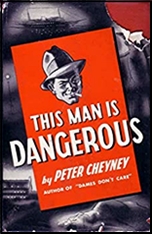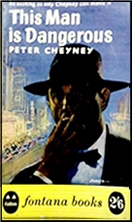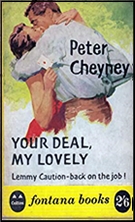Sun 3 May 2020
A 1001 Midnights Review: PETER CHEYNEY – This Man Is Dangerous.
Posted by Steve under 1001 Midnights , Reviews[7] Comments
by Francis M. Nevins
PETER CHEYNEY – This Man Is Dangerous. Lemmy Caution #1. Collins, UK, hardcover, 1936. Coward McCann, US, hardcover, 1938. Reprinted many times. Film: Sonofilm, France, 1954, as Cet Homme Est Dangeureux.

Peter Cheyney (1896-1951) never visited the United States in his life and knew next to nothing about Americans, but in the late 1930s he became an instant success in his native England and in Europe, especially France, a writer or fake-American hard-boiled novels. In This Man Is Dangerous and ten subsequent titles, he chronicled the adventures of rootin’-tootin’-two-gun-shootin’ Lemmy Caution, an indestructible FBI agent who downs liquor by the quart, laughs at bullets flying his way, romances every dame in sight, and blasts away at greasy ethnic-named racketeers and (in thelater novels) Nazi spies.
Americans, of course, saw these ridiculous exercises for what they were, and only the first few were ever published here.
Certainly no one would read Lemmy Cautions for their plots, which are uniform from book to book — all 1hc nasties double-crossing each other over the McGuffin — nor for their characterizations, which are pure comic strip. But mystery fans with a taste for lunacy may be attracted by Cheyney’s self-created idiom. Lemmy narrates his cases in first person and present tense, a wild-and-crazy stylistic smorgasbord concocted from Grade Z western films, the stories of Ring Lardner and Damon Runyon, eyeball-poppers apparently of Cheyney’s own inventor (like “He blew the bczuzu” for “He spilled the beans”), and a steady stream of British spellings and locutions.

Nothing but quotation can convey the Cheyney flavor. From This Man ls Dangerous:
I says good night, and I nods lo the boys. I take my hat from the hall and walk down the stairs to the street. I’m .feeling pretty good because I reckon that muscling in on this racket of Siegella’s is going to be a good thing for me, and maybe if I use my brains and keep my eyes skinned, I can still find some means of double-crossing this wop.
From Don’t Get Me Wrong (1939):
Me — l am prejudiced. I would rather stick around with a bad-tempered tiger than get on the wrong bias of one of these knife-thrown’ palookas. I would rather four-flush a team of wild alligators outa their lunch pail than try an’ tell a Mexican momma that I was tired of her geography an’ did not wish to play any more.

From Your Deal, My Lovely (1941):
Some mug by the name. of Confucius – who was a guy who was supposed to know his vegetables – once issued an edict that any time he saw a sap sittin’ around bein’ impervious to the weather an’ anything else that was goin’, an’ lookin’ like he had been hit in the kisser with a flat-iron, the said sap was suffering from woman trouble.
Lemmy Caution became. so popular on the Continent that Eddie Constantine, an American. actor, portrayed him in a series of French films. These films were so successful that Jean Luc Godard used Constantine as Caution in his New Wave film Alphaville.
Eventually Cheyney launched a second wave of novels, written in a spare ersatz-Hammett style and featuring Slim Callaghan, London’s toughest PI. But for those who love pure absurdity, and appreciate the wild stylistic flights of Robert Leslie Bellem and Henry Kane and Richard S. Prather, a treat of compatible dimensions is in store when they tackle the adventures of Lemmy Caution.
———
Reprinted with permission from 1001 Midnights, edited by Bill Pronzini & Marcia Muller and published by The Battered Silicon Dispatch Box, 2007. Copyright © 1986, 2007 by the Pronzini-Muller Family Trust.
May 3rd, 2020 at 2:10 pm
I read Cheyney extensively when I was a GI stationed in Germany in the 1960s. Most bookshops carried a selection of English titles. Cheyney & Edgar Wallace were always well represented. Nevins’ analysis of the Lemmy Cauition stories is accurate enough but not his conclusion. Cheyney was a good writer. His best work is generally considered to be his espionage series with “Dark” in each title. Tight, nasty little WWII tales of Nazi spies working in London. His Slim Callaghan books are Sam Spade stories set in the UK. The Urgent Hangman is a good example. But as for Lemmy, Cheyney was just having a hoot with the tough guy genre the way Robert Leslie Bellem did with his Dan Turner stories sending up the private eye genre…and with pretty much the same hilarious results. I used to debate often with Wm. F. Nolan to convince Bill that Bellem was a brilliant satirist, not “the worst writer in the pulps.” Same with Cheyney. I guess some people just don’t get the joke…
May 3rd, 2020 at 2:42 pm
I haven’t read any of the Lemmy Caution books but I have read several books in the”Dark”series and enjoyed them very much.
May 3rd, 2020 at 3:49 pm
Everyone seems to agree on the “Dark” series, that Cheyney was at the top of his game by the time he wrote those.
May 3rd, 2020 at 5:14 pm
I read a ‘Slim Callaghan’ recently and, boy, was it crap!
May 3rd, 2020 at 7:50 pm
The Caution books are a caution as my Grandmother might say.
While plot isn’t Cheyney’s strong point his best books capture that jazzy West End London club scene as well as Chandler does LA (not as artfully admittedly).
He was a major influence on Ian Fleming and Bond with DARKBAHAMA as clearly influential on LIVE AND LET DIE as Rohmer’s ISLAND IF FU MANCHU was on DOCTOR NO.
I agree Cheyney knew Caution was for fun in the Bellem vein. It is too different from his other work not to be. Whether his original readers understood the difference I’m not sure.
May 8th, 2020 at 12:13 pm
Francis M. Nevins 2010 review of this book on Mystery*File: https://mysteryfile.com/blog/?p=2838
May 8th, 2020 at 12:28 pm
Ha! That’s a duplicate post. I didn’t catch that. I’d say that I’ve been doing this too loon, but of course I haven’t. Not yet, that is!